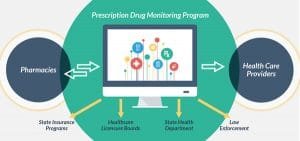PDMP
PDMP's are data bases that collect, store and share controlled substances prescription data for an individual specific state in the US. These PDMP databases represent yet another area where pharmacy technology is emerging quickly and leading the healthcare team to improve the monitoring of a patient's medication therapy and drug compliance. As previously discussed with EPCS (Electronic Prescribing of Controlled Substances), the profession of pharmacy continues to lead the medical field in embracing new technologies and fighting the war against prescription drug abuse in our country.
What Is a PDMP?
 A PDMP basically is simply a prescription drug monitoring program. As initially defined by the National Alliance for Model State Drug Laws (NAMSDL), a PDMP is a shared database of all controlled substance prescriptions that were filled by pharmacies located within an individual state. This sharing of data thus allows authorized users the information necessary to help them stop prescription diversion and prevent drug abuse. Illegal activities by both individuals and physicians can be identified and thus helps prevent both "doctor shopping" by patients and the operation of "pill mills" by doctors. Lastly, another objective of the PDMP's is to help the public by identifying possible patients with addiction problems and getting them the help they need in fighting their disease of addiction.
A PDMP basically is simply a prescription drug monitoring program. As initially defined by the National Alliance for Model State Drug Laws (NAMSDL), a PDMP is a shared database of all controlled substance prescriptions that were filled by pharmacies located within an individual state. This sharing of data thus allows authorized users the information necessary to help them stop prescription diversion and prevent drug abuse. Illegal activities by both individuals and physicians can be identified and thus helps prevent both "doctor shopping" by patients and the operation of "pill mills" by doctors. Lastly, another objective of the PDMP's is to help the public by identifying possible patients with addiction problems and getting them the help they need in fighting their disease of addiction.
Status of PDMP's In Each State
Currently legislation is in place in 49 states (plus the United States territory of Guam) that requires that all controlled substance prescriptions be uploaded to a individual state's PDMP system. Several points are of interest to note in regards to this legislation:1. Although obviously highly encouraged, in a majority of individual states the checking of the PDMP database is optional and not required. This means that the pharmacist is legally not mandated to check the database before actually filling a controlled substance prescription. It seems very likely that this will become mandatory at some point (as it is in New York due to their I-STOP legislation).2. Although the DEA is in no way involved with the state PDMP systems, many feel that it is inevitable that the federal government will become involved at some point. Since the inception of the prescription drug monitoring programs, the federal government has supplied the state's grants for the planning, implementation and maintenance of the programs, but has had no actual involvement or participation in the programs. Federal involvement would, however, mean that the databases for monitoring controlled substance prescriptions could eventually be shared between all states, becoming more accurate and leading to "real time" checking for abuse and prevention.3. Each individual state has its own control of who is allowed authorized access to the PDMP database and prescription record information. The National Alliance for Model State Drug Laws does provide a link for every states' statutes and regulations, plus The Alliance of States with Prescription Monitoring Programs provides a contact list for each individual state for those that may have questions regarding who can access the records.4. Missouri is currently the only state that is not monitoring controlled substance prescriptions and lacking a legislated PDMP system. Efforts to establish one in the state have been repeatedly blocked by a group of legislators led by state Senator Rob Schaaf, who is actually a physician and has voiced concerns over patients' privacy rights. It is important to note that Senator Schaaf has introduced new legislation to allow Missouri to implement a modified version of a PDMP database, but the legislation looks likely to fail until next year.
Pharmacy Technology Consultants and Expertise
If your pharmacy currently does not have a mandated policy to check the PDMP database before actually filling a controlled substance prescription, you may want to consider that it likely will be a federal requirement at some point in the near future. Already a legislated requirement in some states, the time to be pro-active regarding this is now. Healthcare Consultants can assist you now in the development of a system to ensure future legislative compliance requirements are in place. Plus, HCC can provide you with updated written policies and procedures for your P & P manual!If you are like most pharmacy owners and facing the challenges of keeping up with the new and rapidly changing pharmacy technologies, HCC can help. With 28+ years of pharmacy consulting experience and an in-house team that includes both consultant pharmacists and technology experts, HCC can help you make the right decisions in regards to the latest technological advancements that affect pharmacy as both a practice and a business. From major hospitals and healthcare systems to individual community pharmacies, HCC has been the nationally renowned pharmacy consultant firm of choice when it comes to questions regarding technology.We urge you to contact us today to see how HCC can help you and your business. With a full-time staff of in-house Pharmacy Consultant specialists, HCC can answer any questions that you may have in all Pharmacy settings. Contact us online or call us today at 800-642-1652 for a free consultation.
